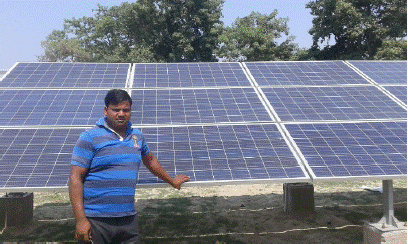No excuses on clean energy
No excuses on clean energy
There can be no more excuses for clean energy solutions designed solely to reduce emissions. It is time to talk, highlight and realise other socio-economic benefits, such as green employment and health - say Aditi Paul and Mihir Bhatt of CDKN India.
Most innovative energy ventures are high on the “clean” agenda but low on the “social” agenda. Solar parks, wind farms and other renewable sources generate sustainable power but struggle to generate a significant amount of sustainable employment. The same can be said of Breakthrough Energy Ventures (BEV) supported by leaders of the international business world. This US$1 billion fund aimed to fight climate change by investing in clean energy innovations worldwide, but fails to understand that until the poor have a sustainable source of income nothing is affordable and climate issues are an insignificant driver in decision making. A coal mining firm offering job security is a more attractive employer to the poor than a global venture talking about climate security.
This has been proven by a recent study from the Centre for Policy Research on co-benefit approaches, which suggests that multi-objectives around socio-economic development need to be identified and addressed through large programmes, schemes, ventures and initiatives. Work by the Centre for Policy Research, supported by CDKN, on Multi-Criteria Decision Analysis explained through a cooking fuel case study that, while all modern technologies may be available to a consumer in either an urban or rural set-up, consumers often show bias towards cultural sensitivity and the cost of buying and maintaining the technologies. Green innovation rarely builds a market framework that can cater to after-sales service requirements, while these additional needs can make or break a shift towards environmental solutions.
Thus, the true success of these funds depends on lower emission matched with higher levels of social development worldwide. If these two benefits are achieved, these funds will set a course towards transformative investment.
[caption id="attachment_69292" align="alignleft" width="413"] Manoj Shah, a young and energetic rural entrepreneur from the Katsa district of Bihar, who owns a 10KW Solar plant which lights 120 households and provides employment to young people. A CDKN supported initiative. Picture credit: Aditi Paul[/caption]
Manoj Shah, a young and energetic rural entrepreneur from the Katsa district of Bihar, who owns a 10KW Solar plant which lights 120 households and provides employment to young people. A CDKN supported initiative. Picture credit: Aditi Paul[/caption]
Examples of such co-benefits being realised are ample. For instance, the CDKN supported initiative ‘Franchisee Model for supporting Decentralised Rural Electrification using Solar Power’ sets time-tested business models for India’s private sector to follow. While there is significant risk involved in investing in Bihar and Uttar Pradesh, states with political instabilities which can threaten ongoing work, the enthusiasm of the local energy entrepreneurs transformed into Renewable Energy Agents has been inspirational. With partners Technology and Action for Rural Advancement and cKinetics, CDKN piloted four projects with village entrepreneurs to establish, run and manage new small-scale solar plants fully financed by the private sector. The business models accessed a mix of equity and loans and has been running successfully for the past year with full recovery measures in place to strengthen local enterprise and support youth employment. It now needs to be scaled-up. The investors behind BEV are ready to provide funding for start-ups and established businesses from 2017.
The need for innovation in clean energy is long recognised and the role global investments can play was underlined at the 5th Annual Summit of Sustainable Business Leadership Forum in New Delhi in 2015. Ckinetics, the forum organisers, enlisted investment needs in innovations in management use, finance, dissemination, and popularisation of clean technology for hyper-growth. Thus the 20 year BEV fund, with aims to invest in the commercialisation of breakthrough technologies in key areas of electricity generation and storage, transportation, industrial processes, agriculture, and energy-system efficiency, can also look into softer yet crucial issues which lead to real breakthroughs and social change.
India has ambitious plans to move to a low carbon economy, detailed by Kirit Parikh of IRADe. His report categorically states the importance of inclusive growth and identifies ways for India achieve it while moving towards a green economy. Private sector funds and venture capitalists must now think along these lines.
The National Solar Mission of India was first conceived as part of the National Action Plan on Climate Change; climate issues and other social issues can actually drive the development agenda and create more business space. There is a significant amount of evidence across the world today that social agendas are driving innovation in the business sector.
Thus not only investment in breakthrough technologies is needed, but also the co-creation of skills and knowledge through creating more green jobs to enhance the use of such technologies. Breakthrough ideas should come with knowledge development and capability enhancement plans, as they are key to success. The World Sustainable Development Summit in New Delhi in October 2016 called for suitable investments in transboundary knowledge creation. Global initiatives like BEV are perhaps the right places to embark such knowledge brokering ideas.
Jagan Shah, Director of the National Institute of Urban Affairs, argued that it is smart for a city to be clean in its use of energy, but smarter when it address near-term needs of people, growth and security, at the National Consultation Planning for Heatwave Management in India in New Delhi in September 2016. Such green investments will and can make a major difference to levels of emission and social development in cities across India, and Asia as a whole.
Picture on right: Woman with solar panel, courtesy DFID. Picture on left: Manoj Shah, an entrepreneur from the Katsa district of Bihar, courtesy Aditi Paul
